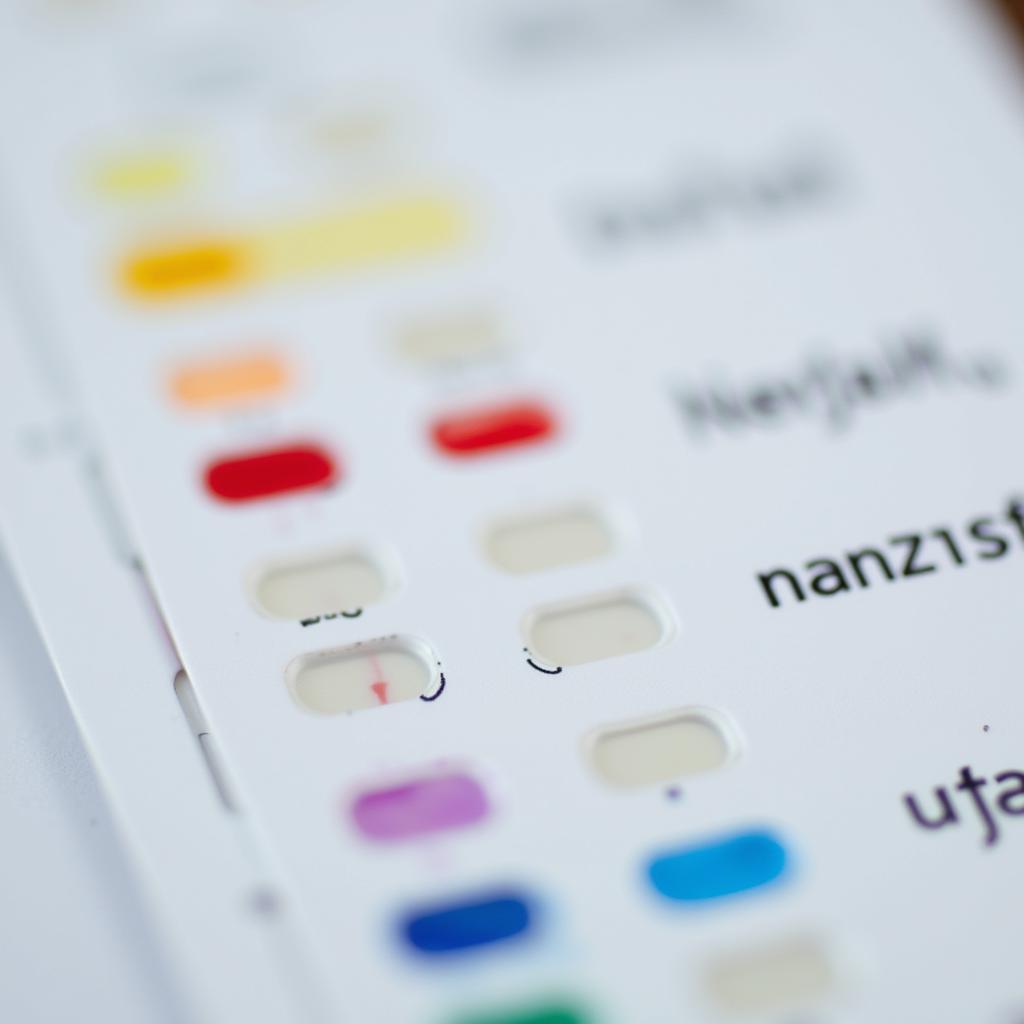Urinalysis, a simple urine test, is a surprisingly powerful tool in diagnosing a wide array of medical conditions. While it may seem like a routine part of a check-up, the information gleaned from analyzing your urine can provide valuable insights into your overall health and help detect potential problems early on.
 Urinalysis test strips
Urinalysis test strips
Deciphering the Messages in Your Urine: What Can Urinalysis Detect?
Your urine isn’t just a waste product; it’s a complex cocktail of chemicals that reflect what’s happening inside your body. Urinalysis examines the physical, chemical, and microscopic components of urine, offering clues about:
- Kidney function: Urinalysis can detect abnormalities like protein or blood in the urine, which can be early signs of kidney disease.
- Urinary tract infections (UTIs): The presence of white blood cells or bacteria in urine often signals a UTI.
- Diabetes: High levels of glucose (sugar) in the urine can indicate diabetes.
- Liver function: Bilirubin, a byproduct of red blood cell breakdown, can show up in urine when the liver isn’t functioning correctly.
- Other conditions: Urinalysis can also provide insights into dehydration, urinary stones, and even some types of cancer.
The Urinalysis Process: From Sample to Results
The process of urinalysis is relatively straightforward:
- Sample Collection: You’ll be provided with a sterile container and asked to collect a “clean catch” urine sample. This method helps prevent contamination of the sample.
- Visual Examination: A lab technician will first examine the urine’s appearance, noting its color, clarity, and odor.
- Dipstick Test: A thin plastic strip treated with chemicals is dipped into the urine sample. The color changes on the strip indicate the presence and levels of various substances.
- Microscopic Analysis: In some cases, a small amount of urine is examined under a microscope to identify and count red and white blood cells, bacteria, crystals, or other elements.
When Urinalysis is More Than Routine: Signs You Might Need One
While urinalysis is often part of a routine physical, there are specific instances when your doctor might recommend this test:
- Symptoms of a UTI: Pain or burning during urination, frequent urination, and cloudy or foul-smelling urine are telltale signs.
- Kidney problems: Back pain, blood in the urine, or changes in urination patterns could indicate a kidney issue.
- Diabetes monitoring: Regular urinalysis can help monitor blood sugar levels in individuals with diabetes.
- Pregnancy: Urinalysis is routinely performed during pregnancy to check for preeclampsia, gestational diabetes, and UTIs.
“Urinalysis is a simple, cost-effective tool that can provide a wealth of information about a patient’s health,” says Dr. Emily Carter, a nephrologist at City Hospital. “It’s often the first step in diagnosing a range of conditions, from UTIs to kidney disease.”
 Doctor discussing urinalysis report
Doctor discussing urinalysis report
Beyond Diagnosis: Urinalysis for Ongoing Monitoring
The value of urinalysis extends beyond initial diagnosis. It can be an effective tool for:
- Monitoring treatment effectiveness: Regular urinalysis can help determine if a treatment plan for a UTI or kidney issue is working.
- Tracking chronic conditions: Individuals with diabetes or kidney disease often undergo routine urinalysis to monitor their condition and adjust treatment if needed.
- Screening for potential health issues: Even if you feel healthy, urinalysis as part of your regular check-up can help detect early signs of certain diseases, when treatment is most effective.
Understanding Your Results: What Do the Numbers Mean?
Your urinalysis report might seem like a jumble of medical jargon, but your doctor can help you understand the results. Here’s a quick overview:
- Color: Normal urine is typically pale yellow. Darker urine can signal dehydration, while reddish or brownish urine might indicate blood.
- Clarity: Urine should be clear. Cloudy urine could be a sign of a UTI or other infection.
- Specific gravity: This measures the concentration of your urine, reflecting your hydration level.
- pH: This measures the acidity or alkalinity of your urine. Abnormal pH levels can indicate kidney stones or UTIs.
- Protein, glucose, ketones, blood: The presence of these substances in your urine, even in small amounts, can be a red flag for various health issues.
Don’t Ignore the Messages in Your Urine
Urinalysis is a valuable, non-invasive, and cost-effective tool that plays a crucial role in healthcare. It can help detect a range of medical conditions, often in their early stages. Be sure to discuss any concerns you have about your urinary health with your doctor, and don’t hesitate to ask about the importance of urinalysis in your overall health assessment.
For any questions or to schedule an appointment, please contact ScanToolUS at +1 (641) 206-8880. Our office is located at 1615 S Laramie Ave, Cicero, IL 60804, USA.
FAQs About Urinalysis
1. How often should I have a urinalysis?
The frequency of urinalysis depends on your individual health status and medical history. Your doctor can recommend the appropriate schedule for you.
2. Is it normal to have some protein in my urine?
Small amounts of protein in the urine are generally not a cause for concern. However, elevated levels can be a sign of kidney disease.
3. Can medications affect my urinalysis results?
Yes, certain medications can interfere with urinalysis results. Be sure to inform your doctor of any medications you are taking, including over-the-counter drugs and supplements.
4. How accurate is a urinalysis test?
Urinalysis is a highly accurate test when performed and interpreted correctly. However, it’s important to note that it’s just one piece of the diagnostic puzzle.
5. What should I do if my urinalysis results are abnormal?
If your urinalysis results are abnormal, your doctor will likely order additional tests to determine the underlying cause and recommend the appropriate treatment plan.
 Microscopic analysis of urine
Microscopic analysis of urine
6. Can I drink water before a urinalysis?
Yes, it’s generally okay to drink water before a urinalysis unless your doctor has given you specific instructions otherwise.
7. How long does it take to get urinalysis results?
Urinalysis results are usually available within a day or two. However, this can vary depending on the lab and the complexity of the analysis.



